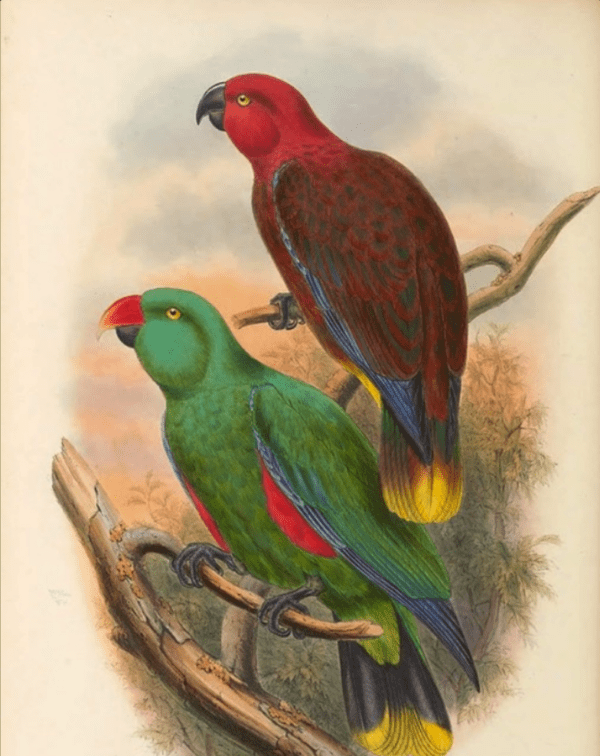DID YOU KNOW?
The Eclectus Parrot species was split in 2019 to four new taxa: Moluccan, Papuan, Tanimbar and Sumba Eclectus.

Eclectus

riedeli
Size:
35 cm (13.6 in)
Weight:
450-600 g (15.75-21 oz)
Subspecies including nominate:
one
Colour Adult:
Male-mainly green as in Eclectus roratus, but neck and lower cheeks more blue/green; tail widely tipped with yellow; smaller in size. Female-mainly red as in E. cornelia, but undertail coverts yellow; tail widely tipped with yellow; smaller in size.
Colour Juvenile:
As in adults but duller; in both sexes upper mandible dark brown/grey tipped yellow. Eye brown.
Call:
In flight: loud, rough screech repeated continuously or in short bursts. Various alarm calls, more mellow calls and a bell-like sound possibly heard before mating.
Content Sources:
BirdLife International
Cornell Lab of Ornithology/Birds of the World
Parrots of the World, Forshaw and Knight, 2010.
Parrots in Aviculture, Low, 1992.
Captive Status:
Not found in captivity.
Longevity:
—
Housing:
—
Diet:
Not recorded.
Enrichment:
—
Nest Box Size:
—
Clutch Size:
2 eggs.
Fledging Age:
—
Hatch Weight:
—
Peak Weight:
—
Weaning Weight:
—
World Population:
10,000-15,000
IUCN Red List Status:
Vulnerable
CITES Listing:
Appendix II
Threat Summary:
Is experiencing a decline due to continued forest loss and local trade.
Range:
Tanimbar Islands, Indonesia.
Habitat:
Most commonly found in primary lowland forest, coastal areas, freshwater swamp and Nypa palm mangrove.
Wild Diet:
Diet consists of fruits, seeds, nuts, leaf-buds and blossoms, mainly Parinarium and Pandanus.
Ecology and Behaviour:
Birds are found singly, in pairs or small groups. Often found soaring high above the forest calling loudly. Wary; foraging groups found in treetops. Mostly active at dawn and dusk traveling to and from roosting areas.
Clutch and Egg Size:
2 eggs.
Breeding Season:
August-September; nest is in tree cavity.
Related Links:
—

![© Biodiversity Heritage Library [Public Domain] via Wikimedia Commons An illustration shows a Tanimbar Eclectus pair, female top and male bottom](https://gt2024.parrots.org/wp-content/uploads/2023/01/Tanimbar-Eclectus-1-100x100.png)